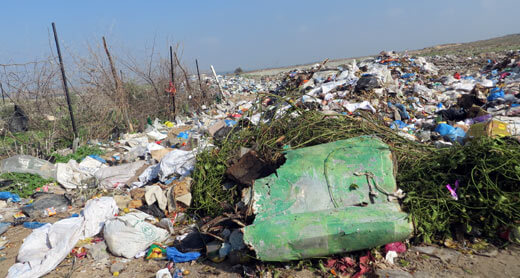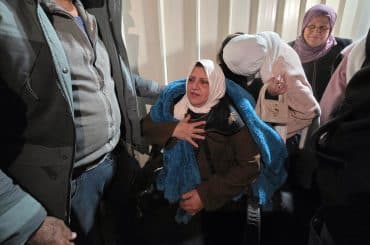“Odeh is dying, they didn’t let [the ambulance] enter”. Those are the crushing words of Radaad Hamad as he recalls the day six weeks ago that Israeli soldiers sat in jeeps meters away and did nothing as his brother lay dying.
Odeh Hamad was killed on his 27th birthday, shot in the head with a live bullet by the Israeli military December 20, 2013. At the time he was with Radaad, and the two brothers were collecting scrap metal at the Beit Hanoun garbage dump in Gaza to support their family. Odeh was 27, and Radad is 23. Both were known among the locals as making their living off collecting scrap.
After Amira Hass wrote about the killing Israel’s military claimed that it had fired warning shots at the men.
“The troops on site repeatedly tried to distance them….”
B’tselem recently issued a report about the killing of Odeh Hamad that tells a different story:
B’Tselem’s inquiries indicate that ‘Odeh Hamad did, indeed, cut some of the barbed wire close to the military perimeter fence, apparently in order to sell the metal. However, B’Tselem’s inquiries have found that, contrary to the Military Spokesperson’s claim, a ‘suspect arrest procedure’ was not carried out. The fact that Hamad was hit in the head rather than in his legs indicates that the shooting did not follow this procedure, which prohibits shooting at the head at any stage. Moreover, according to Radad Hamad’s testimony, no attempt was made prior to the shooting to warn the brothers or to get them to move away from the fence.
‘Odeh Hamad was shot in the head despite posing no danger to anyone. While he was lying wounded, close to the soldiers on the other side of the fence, Red Crescent paramedics wasted precious time trying to find him. The soldiers offered Hamad no medical assistance, nor did they help the paramedics locate him. B’Tselem has written to the MAG Corps demanding that a criminal investigation be launched to examine the circumstances of the shooting, including the fact that the injured Hamad was not given any medical assistance. Although the incident took place over a month ago, the MAG Corps has yet to notify B’Tselem of its decision.
B’Tselem has documented previous cases in which soldiers shot at scrap collectors at the Beit Hanoun garbage dump, yet in most cases there were no injuries. B’Tselem knows of four other cases in the past year and a half in which civilians – including Odeh and Radad Hamad’s brother Khaled and an employee of Beit Hanoun Municipality – were injured under similar circumstances by military gunfire in the garbage dump.
The harsh economic situation and the scarcity of jobs in Gaza leads young men to risk their lives collecting scraps close to Israel’s military perimeter fence. The head of the Beit Hanoun Municipality told B’Tselem field researcher Muhammad Sabah that the municipality is trying to prevent scrap collectors from entering the garbage dump, even fining those it finds there. Two other young men injured in similar incidents told Sabah of the circumstances that made them risk their lives in such a fashion, and of how they were injured.
When Radaad Hamad spoke with B’tselem field researcher Muhammad Sabah he spoke of the conditions of his work as a scrap collector:
For the past two months, my brother ‘Odeh and I have been collecting scraps at the garbage dump northeast of Beit Hanoun, near the perimeter fence in the northern Gaza Strip. We collect plastic and metal scraps: pipes, packaging, lids, boxes, cans and poles. We have no other job and we have to provide for our families.
It’s exhausting work and we hate the smell, but there’s no choice. We go to the dump every day around noon, after the municipality workers dump the garbage. We collect the stuff and sell it to plastic and metal traders. We usually make about 20-30 shekels [approx. 6-9 USD] a day.
On Friday, 20 December 2013, at around 12:00 noon, my brother and I bicycled to the garbage dump. We started gathering scraps a few meters away from the fence, across from the military towers. Suddenly, at around 3:20, I heard gunfire, and then heard my brother shout and fall down. I ran over and found him lying on his back. His head was bleeding. Then a few more shots were fired in our direction, and I got hit in the arm. I didn’t have a phone on me, so I ran to get help. About an hour later, my brother was taken to hospital. He died about ten minutes after getting there.
Amira Hass reminds us the land in which the brothers were shot is within the area Israel has designated as a “buffer zone”(an area that eats up as much as 30% of Gaza’s arable farmland):
The IDF has designated 300 meters beyond the border fence a buffer zone. It is hard for residents of the crowded Gaza Strip to give up this land, most of which is agricultural land. As such, farmers as well as scrap collectors endanger their lives by trying to work in these areas. They believe that the IDF has excellent surveillance equipment, and that soldiers can tell the difference between armed individuals and civilians.

B’Tselem spoke with Iman, Odeh Hamad’s wife, about the day that she says her soul was ripped from her body:
On the afternoon of Friday, 20 December 2013, I got the worst news of my life – that my husband was dead. I was in total shock. I never thought anything like this would happen to us. It was like my soul had been torn from my body. I had nothing left to live for. The future I’d always dreamed about, with my husband and a baby, was lost.
I got the message that my husband was killed while I was busy preparing for his birthday celebration. I was decorating the house so it would be ready when he got home in the afternoon. He thought he’d make enough money that day to buy groceries for the celebration: a cake, candles and soda. But the birthday became a day of death, our happiness turned into grief and the party turned into a gathering of mourners. Just like that, I became a widow. Since then I’ve been in shock, sad, frustrated and hopeless.
Thinking of the soldier whose bullet pierced Odeh’s head, and the others who sat there watching as Odeh lay dying, I’m reminded of the poem “I am you” by Gazan poet Refaat Alareer, editor of Gaza Writes Back. Here’s just a smidgin:
I am just you.
I am your past haunting
Your present and your future.
I strive like you did.
I fight like you did.
I resist like you resisted
And for a moment,
I’d take your tenacity
As a model,
Were you not holding
The barrel of the gun
Between my bleeding
Eyes.
Thanks to the Institute of Middle East Understanding (IMEU) for featuring the video of Radaad above.



”Those who spread treachery, fire and death out of hatred of others are undeserving of pity.”
….Jose Marti
Annie, why don’t you tell us how many bombs have been going off on the border fence during the past few months? I know such news does not make headlines in the media you like to follow. Not only does this news not make headlines, it does not make it anywhere in the back pages as well. Soldiers as well as civilians are being attacked on a ever increasing basis. In December a civilian was killed by a sniper bullet from Gaza. And how do the bombs get to the fence? Do they fly there on the backs of trained pigeons or do you think vulnerable kids are paid to plant them? One would think reading your story that all is quiet on the Gaza border until the day two brother came along to collect plastic bottles. Annie, you read the news that feeds your narrative. That is why you do not understand the full picture.
How many times do we have to hear about the entirely unnecessary and tragic death of a young man at the hands of a cold-blooded Israeli militia, who are utterly indifferent to the deaths of people who offer no threat to them, other than simply being alive and of the wrong parentage? Sickening – how can they complain about boycotts and the revulsion of ordinary people everywhere. Yet their whiny apologists will fill comments with the most feeble lies and witless excuses, which of course will only increase the entirely justified anger at the sadism of the occupation and siege.
RE: “Thinking of the soldier whose bullet pierced Odeh’s head, and the others who sat there watching as Odeh lay dying, I’m reminded of the poem ‘I am you’ by Gazan poet Refaat Alareer . . .” ~ Robbins
MY COMMENT: I am also reminded of the poem “Rypin” by the Israeli poet Aharon Shabtai.
CHRIS HEDGES, 3/05/12: [EXCERPT] . . . The Israeli poet Aharon Shabtai, in his poem “Rypin,” translated by Peter Cole, examined what power, force and self-worship do to compassion, justice and human decency. Rypin was the Polish town his father escaped from during the pogroms.
SOURCE – http://www.commondreams.org/view/2012/03/05-1
P.S.
● Bliss: Wish You Were There [VIDEO, 01:51] – http://www.youtube.com/watch?v=n1SQ8UW-5s4
● Bliss: Wish You Were Here [VIDEO, 05:35] – http://www.youtube.com/watch?v=3f3KhR5oDC4
Bliss (Danish band) – http://en.wikipedia.org/wiki/Bliss_(Danish_band)
If only Odeh wasn’t “not poor” (re: Kate’s litany today on the UNRWA reclassification of Gazans economic situation so that food aid can be reduced, bureaucratically speaking of course).
https://mondoweiss.net/2014/02/militants-targeted-assassination.html
http://www.al-monitor.com/pulse/originals/2014/02/unrwa-siege-gaza-palestine-refugees-aid.html